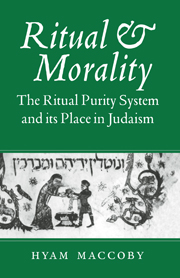Book contents
- Frontmatter
- Contents
- Preface
- Acknowledgments
- List of abbreviations
- 1 The sources of impurity: the human corpse
- 2 The corpse in the tent: an excursus
- 3 The sources of impurity: menstruation
- 4 The sources of impurity: childbirth: the zabah and zab
- 5 Normal emission of semen
- 6 Animals and purity
- 7 Impurity and sacrifices
- 8 The Red Cow: the paradoxes
- 9 The Red Cow and niddah
- 10 Leprosy
- 11 The purification of the leper
- 12 Corpse and leper: an excursus
- 13 Ritual purity in the New Testament
- 14 Milgrom on purity in the Bible
- 15 From demons to ethics
- 16 Ritual purity and morality
- Appendix A The haberim
- Appendix B The rabbinic system of grades of impurity
- References
- Index of quotations
- General index
14 - Milgrom on purity in the Bible
Published online by Cambridge University Press: 24 November 2009
- Frontmatter
- Contents
- Preface
- Acknowledgments
- List of abbreviations
- 1 The sources of impurity: the human corpse
- 2 The corpse in the tent: an excursus
- 3 The sources of impurity: menstruation
- 4 The sources of impurity: childbirth: the zabah and zab
- 5 Normal emission of semen
- 6 Animals and purity
- 7 Impurity and sacrifices
- 8 The Red Cow: the paradoxes
- 9 The Red Cow and niddah
- 10 Leprosy
- 11 The purification of the leper
- 12 Corpse and leper: an excursus
- 13 Ritual purity in the New Testament
- 14 Milgrom on purity in the Bible
- 15 From demons to ethics
- 16 Ritual purity and morality
- Appendix A The haberim
- Appendix B The rabbinic system of grades of impurity
- References
- Index of quotations
- General index
Summary
Jacob Milgrom, in his treatment of ritual purity (Milgrom, 1991), makes use of biblical, rabbinic and Near Eastern material with impressive control. His views on the relationship between the biblical and rabbinic systems, therefore, deserve close attention, especially as they have found wide acceptance and show signs of becoming an orthodoxy.
His overall view is almost the opposite of that of Jacob Neusner. While Neusner thinks that in the Bible ritual purity is required only in the proximity of holy foods and areas (Neusner, 1973, p. 65), Milgrom thinks that the Bible requires purity even outside holy areas, because the very existence of impurity (if unduly prolonged by failure to seek prompt purification) affects the Temple from a distance, causing it defilement. While Neusner thinks that rabbinic legislation extended the scope of ritual purity by requiring it in the home, Milgrom thinks that the effect of rabbinic legislation was to narrow the scope of ritual purity by confining it to the Temple.
The above statement of the views of Milgrom and Neusner is a useful first approximation, but requires some qualification. Milgrom does not think that every form of impurity is equally defiling: the milder forms (i.e. one-day impurities) do not defile the Temple (p. 1051); yet he argues that continued failure to correct them by immersion causes even the milder forms to acquire more virulence.
- Type
- Chapter
- Information
- Ritual and MoralityThe Ritual Purity System and its Place in Judaism, pp. 165 - 181Publisher: Cambridge University PressPrint publication year: 1999



